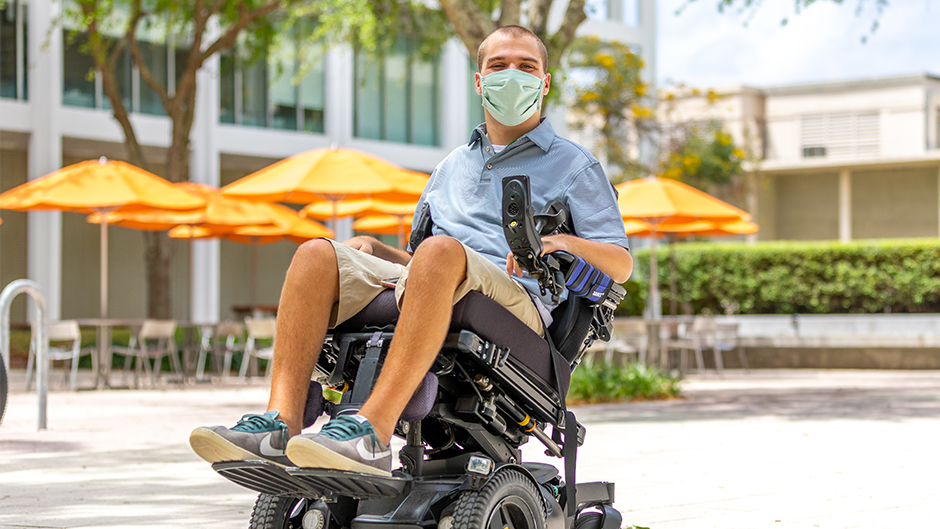In 2016, Ian Malesiewski was in the midst of a break-out season as a talented high school wrestler and football player. His career came to a screeching halt when a wrong turn during a wrestling match left the aspiring athlete with a fractured spine. Paralyzed from the chest down, Malesiewski didn’t let his life-altering injury deter his fortitude.
A junior studying neuroscience, Malesiewski arrived at the University of Miami in 2018. After a year of record snowfall in his hometown of Erie, Pennsylvania, he set his sights on escaping the icy weather to have a full college experience, pursuing a degree in neuroscience to help people, like himself, who have suffered from severe spinal cord injuries.
“Because of my injury, I was looking for somewhere with warm weather. In Erie, if it snowed, I couldn’t get to class in my powerchair,” Malesiewski recalled. “I also wanted to learn about the nervous system, the brain, and the spinal cord. I had the hopes of going to medical school one day.”
Despite his schoolwork as a neuroscience major, Malesiewski realized his injury and experience were steering him to a different career path—advocacy. Last year, he launched the DefIANt Scholars Program, a scholarship fund to help the disabled community break down barriers, stereotypes, and misconceptions inside the classroom. DefIANt Scholars, the name derived from Malesiewski’s first name, also works to facilitate accessibility and independence for disabled students in higher education.
“When you have a disability, you have to buy so many additional things. College is expensive enough. If you have to add on assistive technology, health care, other things for your care attendants, it adds up. I wanted to find a way to give back financially to students with disabilities,” Malesiewski explained.
In June, Malesiewski and peers from his hometown organized a monthlong fundraising initiative, resulting in more than $35,000 of initial funding for the scholarship program.
“I approached my friends back home about creating this scholarship program. They helped me start ‘Walk for Those Who Can’t’ as a fundraising event. In one day, we pulled together a 35-mile walk with sponsors for each mile,” Malesiewski said.
As a result of his efforts founding the DefIANt Scholars Program and advocacy work in the community, Malesiewski has been named a 2021-2022 Newman Civic Fellow, a national fellowship that recognizes and supports community-committed students who are changemakers and public problem-solvers.
“[Ian] has transcended his own personal life-altering experiences to help his local community by advocating for individuals with disabilities,” President Julio Frenk said in nominating Malesiewski for the accolade. “By being a model student and an engaged civic leader, he effectively inspires others to be a catalyst for positive change and strive for equality in the disability community.”
As a Newman Civic Fellow, Malesiewski will join a national network of student leaders to participate in various training sessions to enhance professional learning and develop strategies to continue to nurture his passion to enact social change.
Beyond his work as the president and founder of the DefIANt Scholars Program, Malesiewski serves as the accessibility services liaison on the Diversity, Equity, and Inclusion (DEI) council for the Student Government. In his role, Malesiewski champions for policies to make the University's campus physically and technologically accessible to students with disabilities. His latest initiative involves virtually connecting disabled students to career resources through the Toppel Career Center to ensure a successful transition into the workforce upon graduation.
His zeal and determination are contagious among his peers, said Landon Coles, a junior studying political science and director of the DEI council.
“For years, Ian has been the embodiment of representing our student community with disabilities. He is a straightforward, powerful warrior for accessibility and equity,” Coles said. “I have enjoyed every moment of working with him and admire him for his tenacity, brilliance, and strength in never allowing his physical disability to define him, but to empower him.”
Motivated by his injury and eagerness to continue his advocacy work, Malesiewski plans to pursue a law degree to study disability law upon completing his undergraduate studies in neuroscience.
“All of this has shown me that I want to keep being an advocate for individuals with disabilities who are experiencing discrimination,” Malesiewski pointed out. “I want to keep doing something to make sure that people, like me, get the right accommodations at work or school to have an equitable chance to succeed in life.”

